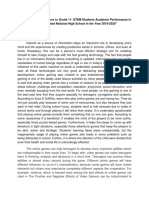0% found this document useful (0 votes)
1K views13 pagesRRL
The document discusses a study on the influence of online gaming on the academic performance and social behavior of grade 11 students. It reveals that boys play more online games than girls, and that playing games does not necessarily affect grades negatively if students know how to limit and control their gameplay. However, excessive online gaming can negatively impact students' health, social skills, and academic performance.
Uploaded by
Jerre Mae EchalarCopyright
© © All Rights Reserved
We take content rights seriously. If you suspect this is your content, claim it here.
Available Formats
Download as DOCX, PDF, TXT or read online on Scribd
0% found this document useful (0 votes)
1K views13 pagesRRL
The document discusses a study on the influence of online gaming on the academic performance and social behavior of grade 11 students. It reveals that boys play more online games than girls, and that playing games does not necessarily affect grades negatively if students know how to limit and control their gameplay. However, excessive online gaming can negatively impact students' health, social skills, and academic performance.
Uploaded by
Jerre Mae EchalarCopyright
© © All Rights Reserved
We take content rights seriously. If you suspect this is your content, claim it here.
Available Formats
Download as DOCX, PDF, TXT or read online on Scribd
/ 13

























































































